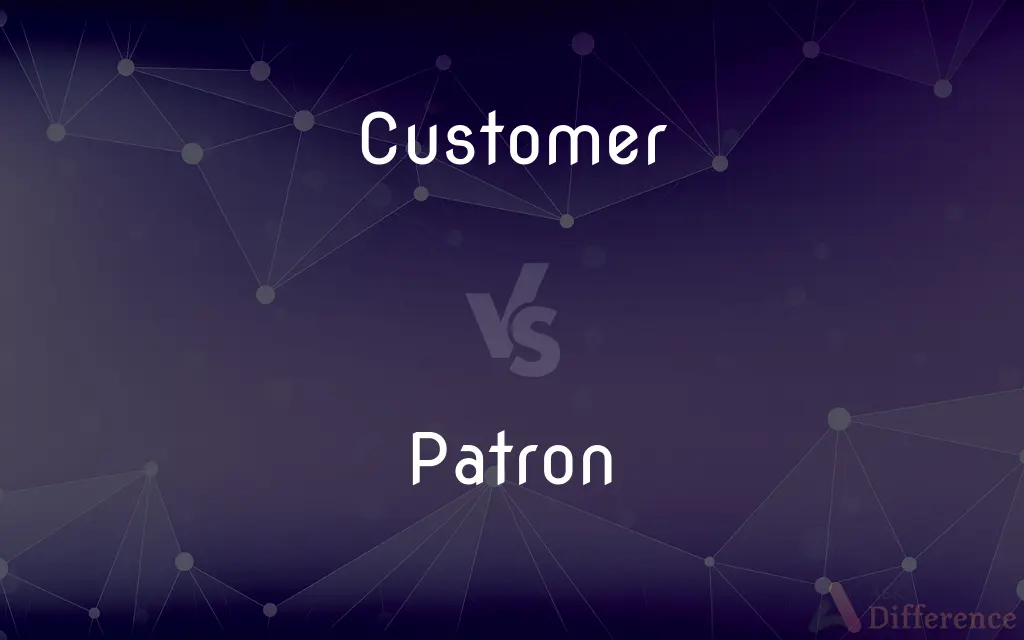Customer vs. Patron — What's the Difference?
By Maham Liaqat & Fiza Rafique — Updated on April 2, 2024
A customer purchases goods or services, focusing on transactions, while a patron supports businesses or causes often out of loyalty or belief in their value.

Difference Between Customer and Patron
Table of Contents
ADVERTISEMENT
Key Differences
A customer is typically involved in a transactional exchange where goods or services are purchased, indicating a direct commercial relationship. This is based on the immediate need or desire for a product. Whereas a patron, while also a buyer or supporter, often has a more enduring relationship with a business or artist, rooted in support or loyalty rather than just transactional needs.
Customers make decisions often based on price, quality, or convenience, showing a preference that can shift with changing conditions or offers from competitors. On the other hand, patrons may continue their support due to personal connection, commitment to a cause, or appreciation of an establishment’s cultural, artistic, or community value, beyond just the product or service offered.
In terms of businesses, companies might see customers as part of a target market or demographic to which they sell products or services. These relationships can be more impersonal and focused on the quantity of transactions. Conversely, patrons are often recognized on a more personal level, with businesses valuing their continued support through special offers, memberships, or acknowledgments that foster a deeper connection.
The interaction with customers is generally straightforward and transaction-based, focusing on the exchange of goods or services for payment. Meanwhile, interactions with patrons can involve elements of gratitude, recognition, and a deeper understanding of needs and preferences, reflecting the value placed on long-term relationships.
The concept of customer loyalty programs attempts to bridge the gap between a customer and a patron by encouraging repeated business through rewards. However, true patronage goes beyond the transactional incentives, often driven by a genuine affinity for the business or its mission.
ADVERTISEMENT
Comparison Chart
Relationship Basis
Transactional, focused on immediate exchange
Supportive, often with a long-term commitment
Decision Factors
Price, quality, convenience
Personal connection, loyalty, appreciation
Business Perspective
Target market, demographic
Valued for continued support, personal connection
Interaction Type
Straightforward, based on transactions
Involves gratitude, recognition, deeper understanding
Loyalty
Can be influenced by loyalty programs
Beyond incentives, driven by genuine support or affinity
Compare with Definitions
Customer
A person who purchases goods or services from a business.
The store offers a discount to first-time customers.
Patron
An advocate or supporter of a business or cause.
Local patrons launched a fundraiser for the library.
Customer
An individual considered in terms of their buying behavior.
The brand analyzes its customers' preferences regularly.
Patron
An individual whose support is acknowledged by the beneficiary.
The museum listed him as a patron in its annual report.
Customer
A party in the role of buyer in a commercial transaction.
Customers queued for the new phone release.
Patron
Someone who supports artists, causes, or institutions, often financially.
As a patron of the arts, he donates to the theater.
Customer
Someone engaged in a single transaction.
The customer paid cash for the coffee.
Patron
A regular customer of a store or business, often with a sense of loyalty.
She's been a patron of the local bookstore for years.
Customer
A user of services provided by a company.
As a customer of the bank, he expects excellent service.
Patron
A person who frequents a particular place, providing steady support.
The cafe's patrons know each other by name.
Customer
In sales, commerce, and economics, a customer (sometimes known as a client, buyer, or purchaser) is the recipient of a good, service, product or an idea - obtained from a seller, vendor, or supplier via a financial transaction or exchange for money or some other valuable consideration.
Patron
A person who gives financial or other support to a person, organization, or cause
A celebrated patron of the arts
Customer
A person who buys goods or services from a shop or business
Mr Harrison was a regular customer at the Golden Lion
Patron
A customer of a shop, restaurant, etc., especially a regular one
We surveyed the plushness of the hotel and its sleek, well-dressed patrons
Customer
A person of a specified kind with whom one has to deal
He's a tough customer
Patron
A patrician in relation to a client.
Customer
One that buys goods or services, as from a store or business.
Patron
A person or institution with the right to grant a benefice to a member of the clergy.
Customer
(Informal) An individual with whom one must deal
That teacher is a tough customer.
Patron
One that supports, protects, or champions someone or something, such as an institution, event, or cause; a sponsor or benefactor
A patron of the arts.
Customer
(obsolete) A habitual patron, regular purchaser, returning client; one who has a custom of buying from a particular business.
Patron
A customer, especially a regular customer.
Customer
A patron, a client; one who purchases or receives a product or service from a business or merchant, or intends to do so.
Every person who passes by is a potential customer.
Patron
(also pä-trōn) The owner or manager of an establishment, especially a restaurant or an inn of France or Spain.
Customer
(informal) A person, especially one engaging in some sort of interaction with others.
A cool customer, a tough customer, an ugly customer
Patron
A noble or wealthy person in ancient Rome who granted favor and protection to someone in exchange for certain services.
Customer
A native official who exacted customs duties.
Patron
A slave owner in ancient Rome who freed a slave without relinquishing all legal claim to him.
Customer
One who collect customs; a toll gatherer.
The customers of the small or petty custom and of the subsidy do demand of them custom for kersey cloths.
Patron
One who possesses the right to grant an ecclesiastical benefice to a member of the clergy.
Customer
One who regularly or repeatedly makes purchases of a trader; a purchaser; a buyer.
He has got at last the character of a good customer; by this means he gets credit for something considerable, and then never pays for it.
Patron
A patron saint.
Customer
A person with whom a business house has dealings; as, the customers of a bank.
Patron
One who protects or supports; a defender or advocate.
Customer
A peculiar person; - in an indefinite sense; as, a queer customer; an ugly customer.
Patron
A guardian or intercessor; patron saint.
St. Joseph is the patron of many different places.
Customer
A lewd woman.
Patron
An influential, wealthy person who supported an artist, craftsman, a scholar or a noble.
Customer
Someone who pays for goods or services
Patron
A customer, as of a certain store or restaurant.
This car park is for patrons only.
Patron
A protector of a dependent, especially a master who had freed a slave but still retained some paternal rights.
Patron
One who has gift and disposition of a benefice.
Patron
(nautical) A padrone.
Patron
A property owner, a landlord, a master. patroon.}}
Patron
To be a patron of; to patronize; to favour.
Patron
To treat as a patron.
Patron
One who protects, supports, or countenances; a defender.
Patron
A master who had freed his slave, but still retained some paternal rights over him.
Let him who works the client wrongBeware the patron's ire.
Patron
One who encourages or helps a person, a cause, or a work; a furtherer; a promoter; as, a patron of art.
Patron
One who has gift and disposition of a benefice.
Patron
A guardian saint. - called also patron saint.
Patron
See Padrone, 2.
Patron
To be a patron of; to patronize; to favor.
Patron
Doing the duty of a patron; giving aid or protection; tutelary.
Patron
A regular customer
Patron
The proprietor of an inn
Patron
Someone who supports or champions something
Common Curiosities
Can a customer become a patron?
Yes, a customer can become a patron if they develop loyalty and consistently support a business over time.
How is a patron different from a customer?
A patron has a more enduring and supportive relationship with a business or artist, often motivated by loyalty or personal connection.
Why do businesses value patrons?
Businesses value patrons for their ongoing support, loyalty, and often higher lifetime value compared to one-time customers.
What role do patrons play in the arts?
Patrons play a vital role in the arts by providing financial support and advocacy, helping to sustain artistic endeavors and institutions.
What motivates a patron’s support?
Patrons are motivated by personal connections, loyalty, appreciation of cultural or community value, and support for causes or missions.
What defines a customer?
A customer is defined by their transactional relationship with a business, purchasing goods or services based on immediate needs.
Do loyalty programs create patrons?
Loyalty programs can encourage repeat business, but true patronage is motivated by factors beyond transactional incentives.
How do businesses recognize their patrons?
Businesses recognize their patrons through acknowledgments, exclusive offers, memberships, and personalized interactions.
How do companies cultivate patrons?
Companies cultivate patrons by fostering personal connections, acknowledging their support, and providing perks or memberships that appreciate their loyalty.
How do patrons benefit from supporting businesses?
Patrons often receive recognition, exclusive access, or benefits, and the satisfaction of supporting valued businesses or causes.
What impact does patronage have on small businesses?
Patronage can significantly impact small businesses by ensuring steady support, financial stability, and community engagement.
Is being a patron limited to businesses?
No, patronage can extend to artists, cultural institutions, and causes, where support goes beyond financial transactions.
What's the importance of customer service to patrons?
Excellent customer service is crucial in nurturing patron relationships by making them feel valued and understood.
Can online businesses have patrons?
Yes, online businesses can also cultivate patrons through excellent service, engagement, and recognition of their support.
How does technology influence customer and patron interactions?
Technology enhances interactions by enabling personalized experiences, easier transactions, and engagement through digital platforms.
Share Your Discovery

Previous Comparison
Core vs. Base
Next Comparison
Inductee vs. InductorAuthor Spotlight
Written by
Maham LiaqatCo-written by
Fiza RafiqueFiza Rafique is a skilled content writer at AskDifference.com, where she meticulously refines and enhances written pieces. Drawing from her vast editorial expertise, Fiza ensures clarity, accuracy, and precision in every article. Passionate about language, she continually seeks to elevate the quality of content for readers worldwide.
















































